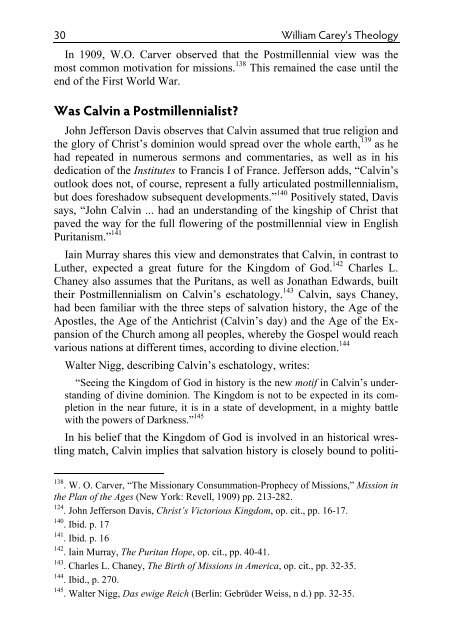William Careys Theology - World Evangelical Alliance
William Careys Theology - World Evangelical Alliance
William Careys Theology - World Evangelical Alliance
You also want an ePaper? Increase the reach of your titles
YUMPU automatically turns print PDFs into web optimized ePapers that Google loves.
30 <strong>William</strong> Carey’s <strong>Theology</strong><br />
In 1909, W.O. Carver observed that the Postmillennial view was the<br />
most common motivation for missions. 138 This remained the case until the<br />
end of the First <strong>World</strong> War.<br />
Was Calvin a Postmillennialist?<br />
John Jefferson Davis observes that Calvin assumed that true religion and<br />
the glory of Christ’s dominion would spread over the whole earth, 139 as he<br />
had repeated in numerous sermons and commentaries, as well as in his<br />
dedication of the Institutes to Francis I of France. Jefferson adds, “Calvin’s<br />
outlook does not, of course, represent a fully articulated postmillennialism,<br />
but does foreshadow subsequent developments.” 140 Positively stated, Davis<br />
says, “John Calvin ... had an understanding of the kingship of Christ that<br />
paved the way for the full flowering of the postmillennial view in English<br />
Puritanism.” 141<br />
Iain Murray shares this view and demonstrates that Calvin, in contrast to<br />
Luther, expected a great future for the Kingdom of God. 142 Charles L.<br />
Chaney also assumes that the Puritans, as well as Jonathan Edwards, built<br />
their Postmillennialism on Calvin’s eschatology. 143 Calvin, says Chaney,<br />
had been familiar with the three steps of salvation history, the Age of the<br />
Apostles, the Age of the Antichrist (Calvin’s day) and the Age of the Expansion<br />
of the Church among all peoples, whereby the Gospel would reach<br />
various nations at different times, according to divine election. 144<br />
Walter Nigg, describing Calvin’s eschatology, writes:<br />
“Seeing the Kingdom of God in history is the new motif in Calvin’s understanding<br />
of divine dominion. The Kingdom is not to be expected in its completion<br />
in the near future, it is in a state of development, in a mighty battle<br />
with the powers of Darkness.” 145<br />
In his belief that the Kingdom of God is involved in an historical wrestling<br />
match, Calvin implies that salvation history is closely bound to politi-<br />
138 . W. O. Carver, “The Missionary Consummation-Prophecy of Missions,” Mission in<br />
the Plan of the Ages (New York: Revell, 1909) pp. 213-282.<br />
124 . John Jefferson Davis, Christ’s Victorious Kingdom, op. cit., pp. 16-17.<br />
140 . Ibid. p. 17<br />
141 . Ibid. p. 16<br />
142 . Iain Murray, The Puritan Hope, op. cit., pp. 40-41.<br />
143 . Charles L. Chaney, The Birth of Missions in America, op. cit., pp. 32-35.<br />
144 . Ibid., p. 270.<br />
145 . Walter Nigg, Das ewige Reich (Berlin: Gebrüder Weiss, n d.) pp. 32-35.
















